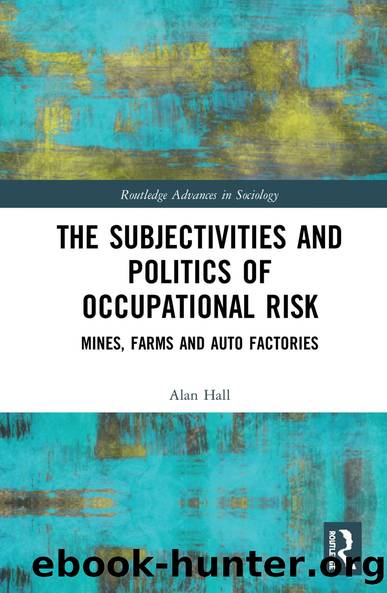The Subjectivities and Politics of Occupational Risk by Alan Hall

Author:Alan Hall [Hall, Alan]
Language: eng
Format: epub
Tags: Psychology, Industrial & Organizational Psychology, Social Science, Sociology, General, Technology & Engineering, Industrial Health & Safety
ISBN: 9781000227604
Google: 1BIHEAAAQBAJ
Publisher: Routledge
Published: 2020-11-29T01:00:29+00:00
The challenge of sustainable agriculture
During the 1970s and 1980s, alternative visions of agriculture emerged to challenge many of the productivist assumptions underlying conventional agriculture (Macrae, Henning and Hill, 1993; Manning, 1986). Rather than the emphasis on capital-intensive, large-scale, highly mechanized, high chemical input farms, proponents of alternative or sustainable agriculture (SA) advocated the elimination or reduced use of synthetic farm chemicals, smaller farm units and appropriate technology; the conservation of finite resources; greater farm and regional self-sufficiency with more direct sales to consumers; and minimally processed foodstuffs (Beus and Dunlap, 1990). Although there were important variations in the definitions of alternative and sustainable agriculture from the outset, these initial formulations were widely understood and presented as substantial moves away from the dominant conventional productivist regime in agriculture (Buttell, 1993; Manning, 1986). As such, while the SA movement included supportive agricultural scientists and agro-ecologists, it was initially a grassroots movement emerging at the level of the farmer and consumer communities.
In Canada, the Ecological Farmers Association of Ontario (EFAO) and the Canadian Organic Growers (COG) were both substantial grower- and consumer-based organizations which started work in the 1970s and 1980s with a primary emphasis on organic gardening and farming. Although the Ontario Federation of Agriculture (OFA), the main farmer organization in Ontario, steadfastly resisted organic farming, the NFU, which was particularly powerful in western grain-growing provinces, adopted a number of policies supporting the development of alternative and organic agriculture in the 1980s and 1990s (more on this later). The development of an urban-based environmental movement, severe pollution problems in the Great Lakes arising from heavy fertilizer use, and the increasingly politicized recognition of the health and ecological effects of pesticide and fertilizer use were also central forces in pushing the development of these alternative ideas (Hall, 1998b).
While concerns about the environmental effects of conventional agricultural chemicals and cropping and tillage practices were central emphases of sustainable agriculture from the outset, there was also a social justice component which carried over from the family farm activism of the 1970s which was also decidedly anti-corporatist (Hall, 1998b, 2007; Hall and Mogyorody, 2001). This linked sustainable agriculture and organic farming to the maintenance of the family farm and rural communities, and cast sustainable agriculture as a challenge to corporate industrial agriculture and the globalization of agricultural markets (Buttell, 1993, p. 22). This included a greater concern with the plights of farm workers, general labour practices and occupational health and safety. Within the Canadian context, a good illustration of this challenge was evident in Vision 2000, a 1990 policy document on sustainable agriculture sponsored by the NFU and the Catholic Rural Life Conference (CRLC). There were two major sets of sustainable objectives established in the document; one was âenvironmental,â and the other was the protection of the âfamily farm and economic security.â To achieve these objectives, the document called for an end to farmersâ dependency on chemical-based production, endorsing a major state and research investment in organic and low-input farming methods. The NFU/CRLC policy document also
Download
This site does not store any files on its server. We only index and link to content provided by other sites. Please contact the content providers to delete copyright contents if any and email us, we'll remove relevant links or contents immediately.
Whiskies Galore by Ian Buxton(41984)
Introduction to Aircraft Design (Cambridge Aerospace Series) by John P. Fielding(33115)
Small Unmanned Fixed-wing Aircraft Design by Andrew J. Keane Andras Sobester James P. Scanlan & András Sóbester & James P. Scanlan(32788)
Aircraft Design of WWII: A Sketchbook by Lockheed Aircraft Corporation(32279)
Craft Beer for the Homebrewer by Michael Agnew(18233)
Turbulence by E. J. Noyes(8040)
The Complete Stick Figure Physics Tutorials by Allen Sarah(7362)
The Institute by Stephen King(7023)
Kaplan MCAT General Chemistry Review by Kaplan(6925)
The Thirst by Nesbo Jo(6925)
Bad Blood by John Carreyrou(6610)
Modelling of Convective Heat and Mass Transfer in Rotating Flows by Igor V. Shevchuk(6431)
Learning SQL by Alan Beaulieu(6276)
Weapons of Math Destruction by Cathy O'Neil(6263)
Man-made Catastrophes and Risk Information Concealment by Dmitry Chernov & Didier Sornette(6001)
Permanent Record by Edward Snowden(5829)
Digital Minimalism by Cal Newport;(5747)
Life 3.0: Being Human in the Age of Artificial Intelligence by Tegmark Max(5543)
iGen by Jean M. Twenge(5408)
